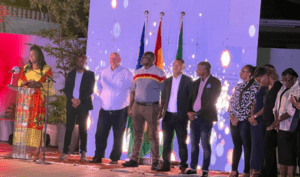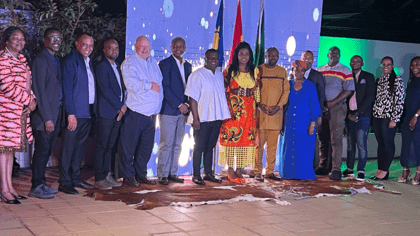By Ernest Bako WUBONTO
In a quest to transform the operation modalities of State-Owned Enterprises (SOEs) in Namibia to become profitable, its government has sent a delegation to Ghana to understudy the blueprint used in the transformation of the SOE sector.
The delegation of 16 officials, drawn from different sectors of the Namibian economy, wants to understand the model deployed by the State Interests and Governance Authority (SIGA) that has delivered the tremendous transformation seen by Ghana’s SOEs within the past five years.
With SOEs and public enterprises in Namibia failing to deliver on their mandate of creating wealth for the indigenous private sector and providing essential social services to eradicate poverty, the government of the southern African country is seeking to learn from best practices that are delivering results on the continent.
SIGA is an authority established under the State Interests and Governance Authority, Act 2019 (Act 990), (the SIGA Law), to ensure that companies and other entities in which the government holds shares are efficiently run, and adhere to good corporate governance and ultimately make a profit.
Over the past five years, SIGA has facilitated the performance management in SOEs and other prescribed bodies, within the framework of government policy, to ensure that they operate efficiently, effectively and profitably; thereby contributing toward the socio-economic development of Ghana.
For instance, in 2017, only 16 out of 175 SOEs filed their annual account reports and, only two were audited accounts. Fast forward to 2023, about 127 entities have filed their annual reports with 85 of these being audited account reports, a feat that many described as unprecedented and worthy of commendation.
This transformative policy initiative has attracted the attention of neighbouring countries who seek to learn best practices from the implementation process to turn their situation around as well, as poor performance of SOEs seems to be the norm on the continent.

Executive Director, Department of Public Enterprises under the Ministry of Finance and Public Enterprises, Namibia, and leader of the delegation, Louise Shixwameni, highlighted that Namibia has about 60 SOEs and public enterprises created to ensure wealth creation for the citizens and uplift communities from poverty; but most of them, just like in other African countries, are not delivering on their mandate despite the significant government subventions annually, hence the need for an urgent transformative drive.
“These SOEs have a mandate to provide key social services and create wealth for the people but they have failed over the years. In Namibia, about 70 percent of the gross domestic product (GDP) is owned by only about 10 percent of the population; and out of this, about 70 percent are foreigners so we want to change this situation fuelled by colonialism and ensure that we restructure public enterprises for citizens to benefit.
“While doing this, we want to ensure that we don’t end up putting the resources into the hands of just a few in the upper class. So we are trying to find the best model that can ensure equal distribution of resources for small businesses in the private sector to also benefit.
“We are looking for a model that will help us restructure our economy strictly based on the private sector but also ensure that this private sector is indigenous-owned. Ghana’s SIGA model is one of the considerations and we are here to learn how it is done so that we can share ideas, learn best practices and implement for our transformation,” she emphasised.
Acting Director-General of SIGA, John Boadu, on his part, stressed that SOEs, state-partnered joint-ventures, public enterprises, investments by governments, among others, have been bedevilled by some challenges which include political interference, lack of innovation and transformation concerning changing trends, corruption and nepotism, and putting square pegs in round holes, among others – situations that are similar in almost all the countries in Sub-Sahara Africa.
However, the establishment of SIGA created a single authority to provide oversight over all these SOEs, unlike the previous model where each one falls under a certain ministry or regulatory agency. This has enhanced oversight and curbed almost all the infractions or irregularities, especially the poor reporting culture.
He added that SIGA introduced a performance contact arrangement with the SOEs which is signed at the beginning of every year with benchmarks to outline what they are supposed to achieve and score them on the Pubic Enterprise League Table (PELT), creating a healthy competition.
These initiatives, he said, accounted for the transformation that other countries seek to emulate.
These remarks were made at a business networking reception held at the residence of the Namibian High Commissioner to Ghana, themed ‘Namibia-Ghana Relations Through State-Owned Enterprises’.










